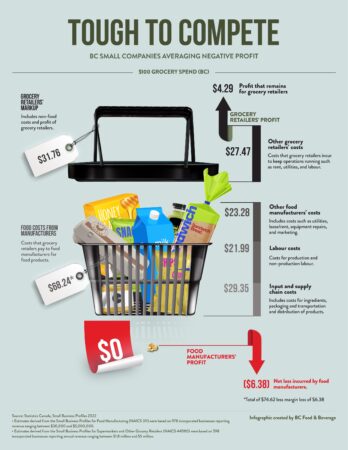BC’s F&B manufacturing industry facing rising costs, low margins

British Columbia’s food and beverage manufacturing industry is a major contributor to the provincial economy, generating $14.2 billion in annual revenue and employing over 39,000 people. However, the industry is facing challenges that threaten its growth and profitability.
The B.C. Food and Beverage (BCFB) association recently conducted a study to evaluate the current state of the F&B manufacturing industry in B.C. The study revealed that the province’s food manufacturing sector is facing several critical issues, including increased pressure on margins from retailers.
Tight margins
According to the study, over the past five years, revenue growth, if any, has primarily come from business expansion and new product launches rather than price increases, which have been difficult to achieve with grocery retailers. This has eroded gross margins, particularly for small to medium-sized manufacturers.

Photo © James Donaldson
In an exclusive interview with Food in Canada, James Donaldson, CEO of BCFB, explained that in retail, retailers won’t accept new products and prioritize their own inventory during blackout periods. He further explained small companies struggle because they “don’t have strong cash flow” to navigate difficulties as well as lack negotiating power to set better pricing on inputs like ingredients and packaging. Small suppliers “pretty much just have to take whatever” is given. They can’t pass on rising prices and must accept them, which is unsustainable in the long term.
Although inflation is stabilizing, Donaldson cautioned “it couldn’t just change again,” and with low margins, small companies “can’t get outside lending,” thus having no money to reinvest in their business, which makes growth impossible.
The other issues highlighted in the State of the Industry Report are the rising cost of:
– inputs;
– skilled labour required to operate equipment/support production; and
– Acquiring or renting appropriate manufacturing facilities/buildings or suitable land to build these facilities.
Statistics Canada data shows that while end retailers enjoy modest profit margins, small to medium-sized manufacturers are facing average profit margins of -9.3 per cent. This contrast shows the financial strain on smaller businesses in the industry.

State of Industry Report infographic © BCFB
Solutions
To address these challenges, the study offers five recommendations.
1. Support the development of a comprehensive competitiveness strategy
BCFB suggests collaborating with the B.C. government to build a detailed plan aimed at improving the overall competitiveness of the food and beverage industry. This strategy will focus on industry-wide challenges such as high input costs and limited commercial space availability. By outlining specific steps and actions, the partnership can fortify the industry’s long-term sustainability and fight economic fluctuations.
2. Improve access to affordable commercial and industrial space
Due to a shortage of industrial land, BCFB advises conducting a thorough assessment of agricultural land reserve (ALR) lands to identify areas suitable for food and beverage manufacturing. Further, incentivizing landowners to prioritize leasing to this sector can help alleviate the scarcity of suitable production space.
3. Facilitate additional investments
By reinforcing existing funding programs or introducing new ones, the government can assist manufacturers in enhancing their operational capabilities and expanding their businesses. This investment in infrastructure will enable productivity gains and foster industry growth.
4. Support programs to attract skilled labour
BCFB has recommended tailored funding initiatives to address specific workforce challenges. This includes programs designed to facilitate upskilling opportunities for existing employees and incentivize the recruitment of skilled workers. By investing in the industry’s human capital, the government can strengthen the workforce and promote long-term industry sustainability, the report said.
5. Provide support to address the imbalance between grocery retail and the F&B manufacturing industry
BCFB calls for measures to fix the imbalance of power between grocery retailers and food and beverage manufacturers. This includes advocating for the implementation of the Grocery Code of Conduct to promote fairer business practices and pricing structures. Additionally, supporting initiatives to introduce more competition into the grocery retail sector can help mitigate the undue influence exerted by major retailers, thereby promoting a more equitable business environment for manufacturers.
The challenges faced by B.C. F&B manufacturers have led them to relocate to nearby regions such as Alberta and Washington state. For instance, Sunrise Foods and Susgrainable shifted their operations to Alberta. Similarly, Conagra Canada, Golden Boy Foods, Aspire Bakeries, and Gizella Pastry have also closed their operations in B.C. and relocated their production to other jurisdictions.
Donaldson stressed the urgency of the matter saying, “We’ve seen businesses close their doors, with each closure representing a loss of at least 200 employees.”
He further said if food production moves out of the province, it is not coming back. “We need a strategy and blueprint now because the longer we wait, the more difficult it will be to recover. It’s already happening…we can’t wait another five years…we need to be having these conversations now.”
The study reviewed the historical and current state of B.C. F&B manufacturing operations and identified current challenges to propose potential actions. It included secondary research using publicly available sources, an online survey of 47 B.C. F&B companies of different sizes and sub-industries, telephone interviews with 10 companies, and a facilitated roundtable with 10 industry executives.
For the full report, click here.
Source: www.foodincanada.com

